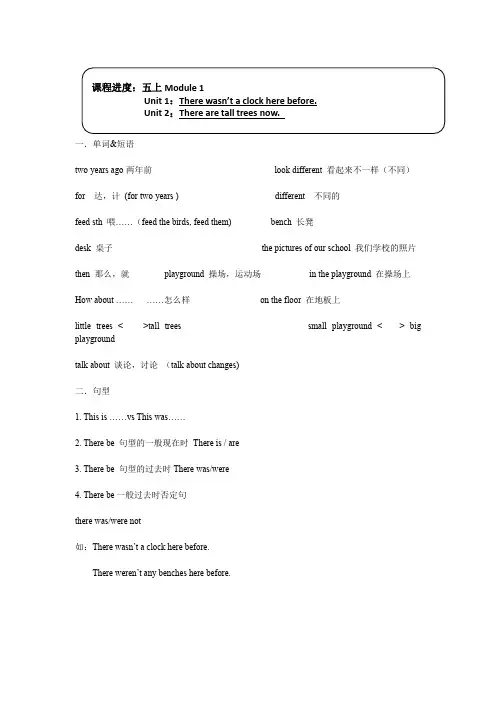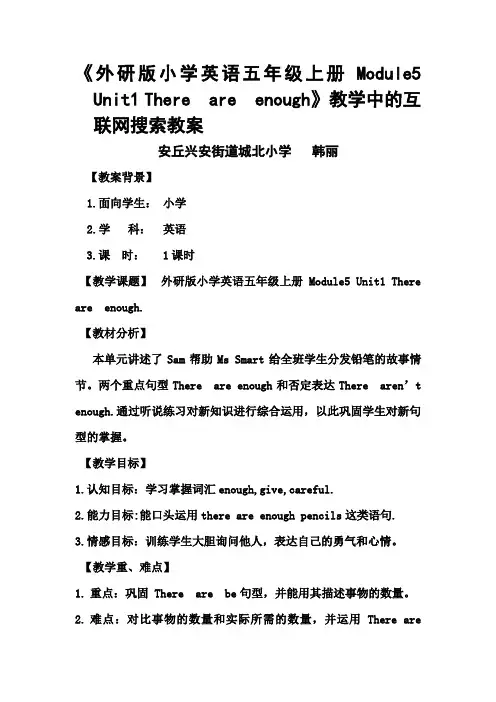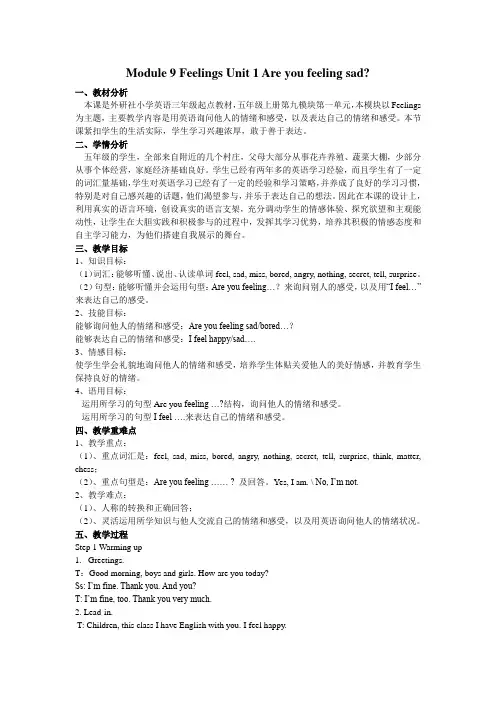外研社小学英语五年级上册单词课文分析
- 格式:doc
- 大小:108.50 KB
- 文档页数:29

- 1 -
外研版小学英语(三起)五年级上册Module10Unit2
基础知识解析(B )
Module10Unit2基础知识解析
Module10Unit2 Don ’t shout,please !请不要大叫!
Amy:Sorry.I don ’t know.对不起。
我不知道。
Ms Smart:Don ’t climb the tree!It ’s dangerous.不要爬树!它是危险的。
Sam:Sorry,Mum.对不起,妈妈。
Ms Smart:Don ’t walk on the grass,Amy!不要在草地上走,埃米! Amy:Sorry.Let ’s go and see the pandas,Sam !
对不起。
让我们去看看熊猫吧,萨姆!
Sam:Great!Let ’s go!太好了!让我们走吧!
3.Look and write.Then say.看一看,写一写。
然后说一说。
Don ’t climb the tree !不要爬树!
【答案链接】左二图:Don ’t walk on the grass!不要践踏草地! 左三图:Don ’t shout!不要大喊大叫!
右一图:Don ’t swim in the river!不要在河里游泳! (Don ’t swim here!不要在这儿游泳!)。

Module 1Uni t l Did you come back yesterday?你们昨天回来的吗?Listen and chant.听一听并说唱。
(教材第2页)课文全译Lingling went to London Town.玲玲去了伦敦城。
She met John,a little boy.她遇见了约翰,一个小男孩。
They visited the London Eye,and saw the city from above the ground.他们参观了伦敦眼,并且从地面上方看城市。
词汇全解必会met /met/ v.(动词)(meet的过去式)碰上。
遇见字母e在met中发/e/。
wet湿的,net网,let让I him on the street last week.上星期我在街上遇见了他。
above /ə`bʌv/ adv.(副词)在上面字母o在above中发/ʌ/。
above prep.(介词)在……上方,在……之上Put it on the shelf above.把它放到上面的搁板上。
ground /graund/ n.(名词)地面字母组合ou在ground中发/au/。
around围绕playground操场on the ground在地上Ben is lying on the ground.本正躺在地上。
Listen,read and act out.听一听,读一读并表演。
(教材第2~3页) 情景详解英语描述Lingling,Amy and Sam met John.They bought some ice creams.When the bus came,Lingling dropped her ice cream on John’s new shoes.汉语描述玲玲、埃米和萨姆遇见了约翰。
他们买了一些冰激凌。
当公共汽车到来时,玲玲把她的冰激凌掉在了约翰的新鞋上。
词汇全解必会those /ðəuz/ adj.(形容词)那些字母组合th在those中发/ð/。

外研版小学英语(三起)五年级上册Module1Unit2基础知识解析Module1Unit2基础知识解析Module1Unit2 We bought ice creams.我们买了冰激凌。
1.Look,listen and say.看一看,听一听,说一说。
——Did Lingling phone you?玲玲给你打电话了吗? ——No,she didn ’t.不,她没有。
——Did she send you an email?——No,she didn ’t.不,她没有。
——Here ’s a postcard from Lingling.It ’s for you.这里有一张来自玲玲的明信片。
它是给你的。
2.Listen and read.听一听,读一读。
Dear Daming,亲爱的大明: Yesterday I went to the park with Sam 昨天我和萨姆、埃米去公园了。
and Amy.We met John in the park.He ’s 我们在公园里遇见了约翰。
他 Sam and Amy ’s friend.We bought ice 是萨姆和埃米的朋友。
我们买了 creams.Then we went home by bus. 冰激凌。
然后我们乘公共汽车回 “Here 来自……”,表示由某人发出或给出,其后可以跟表示人的名词或代词,如果是代词须用其宾格形式。
例如: 那位男士是我的英语老师。
我有一本他给我的书。
3.Now answer the questions.现在回答问题。
Did Lingling go to the park yesterday?昨天玲玲去公园了吗? Did she meet John?她遇到约翰了吗?Did they buy ice creams?他们买冰激凌了吗?Did they go home by bike?他们乘自行车回家了吗? Did Lingling walk to the bus?玲玲走向公共汽车了吗?Did Lingling drop her ice cream?玲玲弄掉了她的冰激凌吗? 【答案链接】Yes,she did. Yes,she did. Yes,they did. No,they didn ’t.They went home by bus.No,she didn ’t.She ran to the bus. Yes,she did. The London Eye 伦敦眼The London Eye goes round and round, 伦敦眼转啊转, round and round, round and round. 转啊转,转啊转。

M O D U L E 1 L o n d o nUnit1 When did you come back?1. Look, listen and learnLingling is in London with Sam and Amy.Amy: Hello, John. How are you ?John: I'm fine, thank you. You're back from China!Amy: Yes, we're home.John: When did you come back?Amy: We came back last Sunday. This is our Chinese friend , Lingling. John: Hello, Lingling.Lingling: Hi, John. Do you live in London, too?John:Yes, I live near Amy and Sam.Lingling:Amy, look at those ice cream!s Let's buy some.John: This is your ice cream, Lingling.Lingling: Thank you !Sam: We're going home now, John. Come with us.Amy: There's our bus!Finish your ice cream, Lingling.John: Hurry up, Lingling. Run!⋯Wait for us!Lingling: Oh no!I dropped my ice cream!John:Oh no!My new shoe!课文生词:how 怎样look at 看fine 好those 那些thank 谢谢ice cream 冰激凌back 回来let's 让我们=let us China 中国buy 买home 回家your 你的when 什么时候thank you 谢谢come 来home 家back 回来now 现在last 上一个with 和... 一起Sunday 星期天bus 公共汽车our 我们的finish 吃完Chinese 中国的hurry up 赶快friend 朋友run 跑hello 你好wait for 等等hi 你好no 不live 居住dropped 掉了(过去式)too 也my 我的live 居住new 新的near 附近shoe 鞋2 .Listen and say.A: When did you come back?B:We came back last Sunday.Oh no !I dropped my ice cream !MODULE 1 Unit 2 Did they buy ice cream?Listen and say.Dear DamingYesterday I went to the park with Sama nd Amy. We met John in the park. He's Sama nd Amy's friend. Web ought ice cream. Then 5 .Listen and say, then sing.Where did you go ? What did you see? Who did you meet inLondon ? Where did you go? What did you see? What did you buy in London? I went to the park. I saw lots of places. I didn t buy anying at all , but I had a lovelytime !生词:when 什么时候 hurry 赶紧,匆忙 back 回来,回到hurry up 快点we went homeb y bus. I ran to the Love 、 Lingling 课文单词词组yesterday 昨天 went 去 park 公园 met 遇见(过去式) friend 朋友 bought 买(过去式) Listen and repeat.e ,eaiChinese river Teacherrabbitbus . But I dropped my ice cream !then 然后went 去(过去式) by bus 乘公共汽车 ran 跑(过去式) dropped 掉 love 爱你的e aletter cat henapplehome 回家,到家wait 等待those 那些drop 落下,掉下ice cream 冰激凌dear 亲爱的with 和... 一起met 遇见(过去式)finish 吃完ran 跑(过去式)MODULE 2 ShoppingUnit 1 How many do you want ?1.Look, listen and learn 。

Module 4Unit 1 Mum bought a new T-shirt for me.妈妈给我买了一件新T恤衫。
Look,listen and say.看一看,听—听,说一说。
(教材第20页)课文全译Ms Smart:Do you like this pair of shorts, Sam?Sam:No, I don’t want shorts.I want trousers.Amy:Mum bought new clothes for Sam!Linalina:Ha ha…斯玛符女士:你喜欢这条短裤吗,萨姆?萨姆:不,我不想要短裤。
我想要长裤。
埃米:妈妈给萨姆买新衣服了!玲玲:哈哈……词汇全解必会pair /peə/ n.(名词)一套,一双,一副字母组合air在pair中发/eə/。
air空气,hair头发pear梨short /ʃɔ:ts/ n.(名词)(常复)短裤字母组合or在shorts中发/ɔ:/。
a pair of shorts一条短裤T-shirt T恤衫short /ʃɔ:t/短的;矮的My shorts are black.我的短裤是黑色的。
短的(short)裤子就是短裤(shorts).Listen,read and act out.听一听,读一读并表演。
(教材第20~21页)情景详解英语描述:Sam and Amy argued with each other,because they both wanted thered T-shirt.At last,Ms Smart told them that the T-shirt was Lingling’s.Then they said sorry to Lingling.汉语描述:萨姆和埃米互相争吵起来,因为他们都想要那件红色的T恤衫。
最后,斯玛特女士告诉他们那件T恤衫是玲玲的。
然后他们向玲玲说抱歉。
词汇全解必会argue /'a:gju:/ v.(动词)争吵,争论字母组合ar在argue中发/a:/。


外研版小学英语(三起)五年级上册Module10Unit2基础知识解析Module10Unit2基础知识解析Module10Unit2 Don ’t shout,please !请不要大叫!1.Listen and chant.听一听,并说唱。
Don ’t walk on the grass.不要在草地上走。
/不要践踏草地。
Don ’t shout in the zoo. 不要在动物园里大叫。
Don ’t climb the tree. 不要爬树。
Let ’s go to school.咱们去上学吧。
2.Listen and read.听一听,读一读。
Woman:Don ’t shout,please!My baby is sleeping.请不要大喊大叫!我的孩子(宝宝,婴儿)在睡觉。
语,表示命令,是个祈使句。
祈使句是用来表示请求、命令、邀请、劝告或建议等的句子,通常省略主语。
祈使句的分类:★肯定句 Be quiet!慢慢去那儿。
★否定句 DonAmy:Sorry.I don ’t know.对不起。
我不知道。
Ms Smart:Don ’t climb the tree!It ’s dangerous.不要爬树!它是危险的。
Sam:Sorry,Mum.对不起,妈妈。
Ms Smart:Don ’t walk on the grass,Amy!不要在草地上走,埃米! Amy:Sorry.Let ’s go and see the pandas,Sam !对不起。
让我们去看看熊猫吧,萨姆!Sam:Great!Let ’s go!太好了!让我们走吧!Don ’t climb the tree !不要爬树!【答案链接】左二图:Don ’t walk on the grass!不要践踏草地! 左三图:Don ’t shout!不要大喊大叫!右一图:Don ’t swim in the river!不要在河里游泳! (Don ’t swim here!不要在这儿游泳!)“Don ’t jump on the bed ,”my sister said.“不要在床上跳,”我姐姐说。

一.单词&短语two years ago两年前look different 看起来不一样(不同)for 达,计(for two years ) different 不同的feed sth 喂……(feed the birds, feed them) bench 长凳desk 桌子the pictures of our school 我们学校的照片then 那么,就playground 操场,运动场in the playground 在操场上How about …… ……怎么样on the floor 在地板上little trees <------->tall trees small playground <------> big playgroundtalk about 谈论,讨论(talk about changes)二.句型1. This is ……vs This was……2. There be 句型的一般现在时There is / are3. There be 句型的过去时There was/were4. There be一般过去时否定句there was/were not如:There wasn’t a clock here before.There weren’t any benches here before.5. 一般现在时的一般疑问句结构:Do/Does +主语+动词原形+……+表时间的词语+?注意:主语是第三人称单数的,把Does提前。
主语除去第一、二人称及第三人称的复数形式,其余的都属于三单例句:Does London look different now ?回答:Yes, it does (主语+ do/does)/ No, it doesn’t. (主语+ do/does+not )例句:Do you like the park now ?回答:Yes, I do.(一般疑问句中的主语是第二人称的,回答要变为第一人称I或we) No, I don’t.一.单词和短语heavy 重的let 允许,让come on 快点sell 卖,销售sometimes 有时over there 在那边put ……in ……把……放在……里put the bags in the car:把包放在车里carry 运送,搬运helpful 有帮助的,乐于助人的a lot of = lots of 后跟可数名词复数或不可数名词二.句型:1. Let’s=Let us + 动词原形让我们……吧。

外研版英语五年级上册课文动画第三单元《外研版英语五年级上册第三单元课文动画:《Make a Home Library》的详细解析与赏析》。
一、课文原文及翻译。
原文。
Activity 1 Listen, read and act out.Ms Smart: Let's make a home library.Lingling: Great!Ms Smart: What can we put in our library?Lingling: We can put some books on the shelves.Ms Smart: That's a good idea. Let's put some CDs on the shelves too.Lingling: And we can put a big desk in the library. We can read books and do our homework there.Ms Smart: Good. Let's put some pictures on the wall.Lingling: All right. Let's clean the library now.翻译。
活动1 听一听,读一读并表演出来。
斯玛特女士:咱们建一个家庭图书馆吧。
玲玲:太棒了!斯玛特女士:我们可以在我们的图书馆里放些什么呢?玲玲:我们可以把一些书放在书架上。
斯玛特女士:这是个好主意。
咱们也把一些光盘放在书架上吧。
玲玲:而且我们可以在图书馆里放一张大书桌。
我们可以在那里看书和做作业。
斯玛特女士:好的。
咱们在墙上挂一些图片吧。
玲玲:好的。
咱们现在打扫一下图书馆吧。
二、重点词汇与短语解析。
(一)重点词汇。
1. library.- 读音:英 [ˈlaɪbrəri] 美 [ˈlaɪbreri]。
- 词性:名词。
- 释义:图书馆;藏书室。

《外研版小学英语五年级上册Module5 Unit1 There are enough》教学中的互联网搜索教案安丘兴安街道城北小学韩丽【教案背景】1.面向学生:小学2.学科:英语3.课时: 1课时【教学课题】外研版小学英语五年级上册Module5 Unit1 There are enough.【教材分析】本单元讲述了Sam帮助Ms Smart给全班学生分发铅笔的故事情节。
两个重点句型There are enough和否定表达There aren’t enough.通过听说练习对新知识进行综合运用,以此巩固学生对新句型的掌握。
【教学目标】1.认知目标:学习掌握词汇enough,give,careful.2.能力目标:能口头运用there are enough pencils这类语句.3.情感目标:训练学生大胆询问他人,表达自己的勇气和心情。
【教学重、难点】1.重点:巩固 There are be句型,并能用其描述事物的数量。
2.难点:对比事物的数量和实际所需的数量,并运用There areenough./There aren’t enough描述。
【教学方法】1.以“活动”激发兴趣在游戏中学习词汇.2.在唱、做中学习语句.3、在扮演中运用语言.【教学准备】单词卡片、表情卡片、录音机、挂图等。
【教学过程】一、组织教学教师进入教室,用Hello! Everyone. Good Morning/ afternoon/How are you? 等日常用语进行问候。
学生要根据老师的问候语做出相应回答。
二、课前展示分组展示歌曲“Children of the world”鼓励学生演唱时加上动作表情。
三、新科教授(一)导入新课教师向全班提问:“Open your pencil boxes.How many pencils Are there in your pencil boxes?Are there enough pencils for you?引导学生回答:“Yes ,there are enough.”帮助学生理解“enough”的意思,引出今天的课文。

Module 9 Feelings Unit 1 Are you feeling sad?一、教材分析本课是外研社小学英语三年级起点教材,五年级上册第九模块第一单元,本模块以Feelings 为主题,主要教学内容是用英语询问他人的情绪和感受,以及表达自己的情绪和感受。
本节课紧扣学生的生活实际,学生学习兴趣浓厚,敢于善于表达。
二、学情分析五年级的学生,全部来自附近的几个村庄,父母大部分从事花卉养殖、蔬菜大棚,少部分从事个体经营,家庭经济基础良好。
学生已经有两年多的英语学习经验,而且学生有了一定的词汇量基础,学生对英语学习已经有了一定的经验和学习策略,并养成了良好的学习习惯,特别是对自己感兴趣的话题,他们渴望参与,并乐于表达自己的想法。
因此在本课的设计上,利用真实的语言环境,创设真实的语言支架,充分调动学生的情感体验、探究欲望和主观能动性,让学生在大胆实践和积极参与的过程中,发挥其学习优势,培养其积极的情感态度和自主学习能力,为他们搭建自我展示的舞台。
三、教学目标1、知识目标:(1)词汇:能够听懂、说出、认读单词feel, sad, miss, bored, angry, nothing, secret, tell, surprise。
(2)句型:能够听懂并会运用句型:Are you feeling…?来询问别人的感受,以及用“I feel…”来表达自己的感受。
2、技能目标:能够询问他人的情绪和感受:Are you feeling sad/bored…?能够表达自己的情绪和感受:I feel happy/sad….3、情感目标:使学生学会礼貌地询问他人的情绪和感受,培养学生体贴关爱他人的美好情感,并教育学生保持良好的情绪。
4、语用目标:运用所学习的句型Are you feeling …?结构,询问他人的情绪和感受。
运用所学习的句型I feel ….来表达自己的情绪和感受。
四、教学重难点1、教学重点:(1)、重点词汇是:feel, sad, miss, bored, angry, nothing, secret, tell, surprise, think, matter, chess;(2)、重点句型是:Are you feeling …… ? 及回答。
Module1 Unit2 We bought ice creams.一、教学内容1、词汇:send, email, ran, love2、语句:We bought ice creams.3、课文学习二、教学目标1、全体学生能理解词汇:send, email, ran, love2、全体学生能运用词汇:email, ran, love, 部分学生能运用词汇:send3、全体学生能运用:We bought ice creams.这类语句来谈论和描述过去发生的事情。
4、带领学生感知语音:/i:/, /i/, /e/等。
三、教学重难点1、重点:本单元单词的掌握。
能用:We bought ice creams.这类语句谈论过去发生的事情。
2、难点:使用动词过去式描述过去发生的事情。
四、教学准备1、Cards2、Tape(点读笔)3、CAI(课件)五、教学过程一)Warming up1、Greetings2、Chant (拍着拍子说。
Unit1)二)Review ( the past tense verbs )Come come came We came back.Go go went I went to the park.Buy buy bought We bought ice creams.Drop drop dropped I dro pped my ice cream.Run run ran I ran to the bus.Meet meet met We met John in the三)Lead inT; Lingling is in London now. Where is Daming? Is Daming in London too? Let’s have a look. ( 导入SB Unit2 活动1)1、Listen and understand, then answer the questions.(刚才老师提的问题)2、Words teaching: send, email. (并对“send”进行运用训练)3、Listen and repeat.(注意语音语调)四)Text learning1、播放课文录音,请学生理解课文大意。
五年级英语上册Unit1(单词+课文+考点)单词hobby爱好、嗜好['hɒbɪ]model模型['mɒdl]collect收集[kə'lekt] stamp邮票[stæmp]more更;更多[mɔː]than比[ðæn]more than多于[mɔːðæn] country国家['kʌntrɪ]keep保持;饲养[kiːp]animal动物['ænɪm(ə)l] every每['evrɪ]during在...期间['djʊərɪŋ]课文Janet: what are you doing, Jiamin?你正在干什么,嘉明?Jiamin: I’m making a model plane. I love making models. It’s my hobby.我正在制作一个模型飞机。
我喜爱做模型。
这是我的爱好。
Xiaoling: What’s your hobby, Janet?珍妮特,你的爱好是什么?Janet: I collect stamps. I have more than 500 stamps from 20 countries.我收集邮票。
我有来自20多个国家的500多张邮票。
Xiaoling: Wow! So many stamps!哇!好多邮票!Jiamin: What’s your hobby, Xiaoling?小玲,你的爱好是什么?Xiaoling: My hobby is keeping pets. I love animals, you know. I have two dogs, a cat and three birds.我的爱好是养宠物。
你知道的,我喜欢动物。
我有两只狗,一只猫和三只鸟。
【重点考点一】love的用法1>love doing sth. 表示长时间地喜欢做某事,尤指兴趣爱好,时间范围长如:She loves dancing.她喜爱跳舞。
五年级上册英语外研版,第一单元的课文一、课文概述五年级上册英语外研版第一单元的课文以一个有趣的故事为主线,引导学生学习新的词汇和语法知识。
故事中,主人公小明和他的朋友们在公园里度过了一个愉快的下午,他们在玩耍的过程中学习到了许多新知识。
本文通过生动的情节和对话,让同学们在轻松愉快的氛围中学习英语。
二、课文重点词汇和语法1.重点词汇(1)动物:cat,dog,bird,elephant,monkey(2)颜色:red,blue,green,yellow,black(3)动作:run,jump,climb,swing,play(4)方位词:in,on,under,behind,in front of2.重点语法本单元主要介绍了一般现在时态的疑问句和回答方式。
疑问句构成方式为:助动词(do/does)+ 谓语动词原形+ 其它成分。
例如:What do you like? 你喜欢什么?三、实用学习建议1.结合课文图片,直观地理解课文内容,加深对动物、颜色和动作的记忆。
2.通过角色扮演的方式,模仿课文对话,提高口语表达能力。
3.制作单词卡片,将单词和图片对应,方便随时复习。
4.创造自己的小故事,运用所学词汇和语法知识进行练习。
四、课后实践与应用1.和家人或朋友一起去公园,用英语描述你们在公园里的活动。
2.观察周围的物体,用英语描述物体的位置关系。
3.将所学知识运用到日常生活中,如:询问别人喜欢什么颜色、动物等。
4.定期复习本单元所学内容,巩固词汇和语法知识。
通过以上学习,相信同学们能够更好地掌握本单元的知识,提高英语应用能力。
MODULE 1 London Unit1 When did you come back? 1. Look, listen and learn Lingling is in London with Sam and Amy. Amy: Hello, John. How are you ? John: I'm fine, thank you. You're back from China! Amy: Yes, we're home. John: When did you come back? Amy: We came back last Sunday. This is our Chinese friend , Lingling. John: Hello, Lingling. Lingling: Hi, John. Do you live in London, too? John:Yes, I live near Amy and Sam. Lingling:Amy, look at those ice creams!Let's buy some. John: This is your ice cream, Lingling. Lingling: Thank you ! Sam: We're going home now, John. Come with us. Amy: There's our bus!Finish your ice cream, Lingling. John: Hurry up, Lingling. Run!…Wait for us! Lingling: Oh no!I dropped my ice cream! John:Oh no!My new shoe! 课文生词: how 怎样 fine 好 thank 谢谢 back 回来 China 中国 home 回家 when 什么时候 come 来 back 回来 last 上一个 Sunday 星期天 our 我们的 Chinese 中国的 friend 朋友 hello 你好 hi 你好 live 居住 too 也 live 居住 near 附近 look at 看 those 那些 ice cream 冰激凌 let's 让我们=let us buy 买 your 你的 thank you 谢谢 home 家 now 现在 with 和...一起 bus 公共汽车 finish 吃完 hurry up 赶快 run 跑 wait for 等等 no 不 dropped 掉了(过去式) my 我的 new 新的 shoe 鞋 2 .Listen and say. A: When did you come back? B:We came back last Sunday. Oh no !I dropped my ice cream ! MODULE 1 Unit 2 Did they buy ice cream? Listen and say. Dear Daming Yesterday I went to the park with Sam and Amy. We met John in the park. He's Sam and Amy's friend. We bought ice cream. Then we went home by bus. I ran to the bus . But I dropped my ice cream! Love、 Lingling 课文单词词组 yesterday 昨天 went 去 park 公园 met 遇见(过去式) friend 朋友 bought 买(过去式) then 然后 went去(过去式) by bus 乘公共汽车 ran 跑(过去式) dropped 掉 love 爱你的 Listen and repeat. e ,ea i e a Chinese river letter cat Teacher rabbit hen apple 5 .Listen and say, then sing. Where did you go ? What did you see? Who did you meet in London ? Where did you go? What did you see? What did you buy in London? I went to the park. I saw lots of places. I didn't buy anying at all , but I had a lovely time! 生词: when 什么时候 back 回来,回到 home 回家,到家 those 那些 ice cream 冰激凌 with和...一起 finish 吃完 hurry 赶紧,匆忙 hurry up 快点 wait 等待 drop 落下,掉下 dear 亲爱的 met 遇见(过去式) ran 跑(过去式)
MODULE 2 Shopping Unit 1 How many do you want ? 1.Look, listen and learn。 Ms Smart: Let's go to the supermarket , Ling ling . We need food for our picnic. At the Supermarket Ms Smart: Can you read the shopping list to me, please? Lingling: The first thing is bananas. How many do you want? Ms Smart: Six, please. Amy and Sam like bananas. Do you like bananas? Lingling: Yes, I do. Ms Smart: Good. What's next? Lingling; Cheese. I can see the cheese. How much cheese do you want? Ms Smart: Half a kilo . Do you like cheese , Lingling? Lingling: No, I don't . I like noodles. Ms Smart: Okay, let's buy one kile of noodles! Lingling: Great! 词汇表: supermarket 超市 need 需要 food食物 picnic野餐 read 读 shopping购物 list清单 first 第一 thing 东西 bananas 香蕉(复数) how many 多少 want 想要 six 六 like 喜欢 good 好 next 下一个 cheese 奶酪 see 看见 how nuch 多少 half 一半 kilo 公斤 noodles面条(复数) okey 好 buy 买 great 太棒了 4.Listen and say. A: How many bananas do you want? B: Six, please. A: Do you like cheese,Lingling? B: No, I don't. I like noodles. MODULE 2 Unit 2 How much milk do you want? 1. Listen and say. What are we going to take on our picnic? Let's make a list. What about juice? Yes. How much do we need? Six boxes. All right!词汇表: take 带 picnic 野餐 make 做,列 list 清单 juice 果汁 need 需要 boxes 盒(复数) all right 好吧 3. Listen and repeat. u,o ar, a a,er ir , ur duck arm balloon bird mother glasses teacher nurse 4. Listen and say, then sing. How many do you want ? How many apples ? How many do you want? A kilo or two, a kilo or two? Here's a big bag for you. How much milk? How much juice ? How much do you want? A bottle or two, a bottle or two? Here are two big bottles for you. 生词: need 需要 food 食物 shopping list 购物单 cheese 奶酪 how much 多少(用于不可数名词) kilo 千克 juice 果汁 box 盒子 bottle 瓶子
MODULE 3 At the Weekend Unit 1 We visited lots of places Look,listen and learn Amy:Hello,Daming.How are you? Daming:I'm fine,thanks.What did you do at the weekend? Amy:We visited lots of places. Daming:Where did you go? Amy:We went to the British Museum.And we visited Big Ben and the London Eye. Daming:What's the London Eye? Amy:It's a big wheel.It's wonderful.